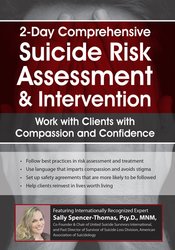

The epidemic of suicide continues to wreak havoc in the lives of millions of Americans.
With suicide rates on the rise, the need is urgent for clinicians who can recognize warning signs earlier, intervene with current and proven strategies, and even inoculate clients against the chance of suicidal thoughts emerging in the future. It’s a daunting challenge that has undoubtedly left you feeling confused, overwhelmed, and even scared.
Don’t let fear push you away.
This recording will transform how you view and work with suicidal clients and give you the clinical tools you need to save lives. Over the course of the program, you will dive deeply into a comprehensive approach to suicide risk assessment and intervention. You will gain confidence and a heightened sense of compassion that are essential to understanding where clients are on their life journeys and how you can instil hope and a renewed desire to invest in lives that are worth living.
Finish this recording feeling confident and capable to work with suicidal clients and guide them out of the darkness and back into the light!
This online program is worth 12.75 hours CPD.
| File type | File name | Number of pages | |
|---|---|---|---|
| Manual - 2-Day Comprehensive Suicide Risk Assessment & Intervention (22.32 MB) | 119 Pages | Available after Purchase | |
| Manual - 2-Day Comprehensive Suicide Risk Assessment & Intervention - French (22.32 MB) | 119 Pages | Available after Purchase | |
| Manual - 2-Day Comprehensive Suicide Risk Assessment & Intervention - Italian (22.32 MB) | 119 Pages | Available after Purchase |

Sally Spencer-Thomas, PsyD, is a clinical psychologist and inspirational international speaker. Dr. Spencer-Thomas was moved to work in suicide prevention after her younger brother, a Denver entrepreneur, died of suicide after a difficult battle with bipolar condition.
Dr. Spencer-Thomas has been an invited speaker at the White House on the topics of mental health and suicide prevention and has held leadership positions for the National Action Alliance for Suicide Prevention, the International Association for Suicide Prevention, the American Association for Suicidology, and the National Suicide Prevention Lifeline. She has won multiple awards for her leadership including the 2014 Survivor of the Year from the American Association of Suicidology, the 2014 Invisible Disabilities Association Impact Honors Award, the 2012 Alumni Master Scholar from the University of Denver, the 2015 Farbarow Award from the International Association for Suicide Prevention and the 2016 Career Achievement Alumni Award from the University of Denver’s Graduate School of Professional Psychology.
She has a Doctorate in clinical psychology from the University of Denver, a Masters in non-profit management from Regis University, and a bachelor’s in psychology and studio art with a minor in economics from Bowdoin College. She has written four books on mental health and violence prevention.
Speaker Disclosures:
Financial: Sally Spencer Thomas maintains a private practice and receives royalties as a published author. She receives a speaking honorarium and recording royalties from PESI, Inc. She has no relevant financial relationships with ineligible organizations.
Non-financial: Sally Spencer Thomas is the president of United Suicide Survivors International and is a member of the executive board for the American Association of Suicidology. She is co-chair of the Workplace Special Interest Group for the International Association of Suicide Prevention and is a member of the Suicide Prevention Lifeline.
OVERCOME BIAS AND FEAR
Prepare to do suicide work with compassion and confidence
HOT TOPICS IN SUICIDOLOGY
Evaluate the latest developments and their impact on assessment and intervention
COMPREHENSIVE APPROACH TO SUICIDE RISK ASSESSMENT & TREATMENT
Determine where to enter the prevention stream, and how to navigate successfully
RISK ASSESSMENT
Elicit key information from clients
COLLABORATIVE SAFETY AGREEMENTS AND WELLNESS PLANNING
Help clients regulate emotions and feel safe, valued and connected
MAKING MEANING
Help clients reinvest in a life worth living
SAFE AND EFFECTIVE SUICIDE GRIEF & TRAUMA RESPONSE
Implement suicide grief and trauma support
| 5 |
|
| 4 |
|
| 3 |
|
| 2 |
|
| 1 |
|
Satisfaction Guarantee
Your satisfaction is our goal and our guarantee. Concerns should be addressed to info@pesi.co.uk or call 01235847393.
Please wait ...